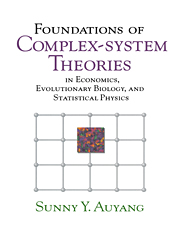Book contents
Summary
A Look Backward and Forward
Science reveals complexity unfolding in all dimensions and novel features emerging at all scales and organizational levels of the universe. The more we know the more we become aware of how much we do not know. Gone is the image of a clockwork universe. Equally untenable are the image of a clockwork science that claims to comprehend all the diversity by a single method and a single set of laws and the clockwork scientists who are absorbed in deducing the consequences of the laws by applying given algorithms. Scientific research is a highly creative activity. Scientific creativity, however, is not anything-goes arbitrariness. There are general guiding principles, which are discernable across diverse disciplines.
We have examined the general way in which theoretical reason comes to grip with complexity. This synthetic microanalytic approach is not restricted to science. Readers would hear a familiar ring in the following passage from a textbook in computer engineering: “The techniques we teach and draw upon are common to all of engineering design. We control complexity by building abstractions that hide details when appropriate. We control complexity by establishing conventional interfaces that enable us to construct systems by combining standard, well-understood pieces in a ‘mix and match’ way. We control complexity by establishing new languages for describing a design, each of which emphasizes particular aspects of the design and deemphasizes others.”
- Type
- Chapter
- Information
- Foundations of Complex-system TheoriesIn Economics, Evolutionary Biology, and Statistical Physics, pp. 341 - 346Publisher: Cambridge University PressPrint publication year: 1998



